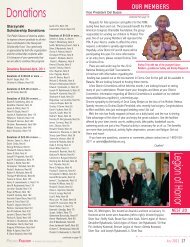Happy Easter! - SOKOL ONLINE
Happy Easter! - SOKOL ONLINE
Happy Easter! - SOKOL ONLINE
Create successful ePaper yourself
Turn your PDF publications into a flip-book with our unique Google optimized e-Paper software.
MEMBER NEWS<br />
Falcon<br />
Fitness<br />
by Greg Gushard<br />
All About Marathons<br />
Spring is fast approaching. It might not feel like it, for those of us who were<br />
hit by forty plus inches of snow during the month of February, but April showers<br />
and May flowers are on their way. With the nicer weather on it’s way,<br />
maybe it’s time to start thinking about participating in a local, or regional<br />
marathon? There are many organizations that hold events like these for great<br />
causes. “Race for the Cure” comes to mind. Participating in these races are<br />
both rewarding and they help you in your quest for weight loss. Your support<br />
goes a long way in helping others.<br />
So you’ve found a race worthy of racing, but how do you train for it? Unless<br />
you’re already an in-shape track runner prepared to take 1st place, you will<br />
need to train. Marathons are long, and focus on endurance rather than<br />
straight out sprinting speed. It is important to remember that you’re not in it to<br />
beat 100 other contestants. You’re in it to prove to yourself that you can do it.<br />
You can run five miles at a reasonable pace. So many “new” runners start off<br />
with an all out sprint, and run out of gas halfway through the actual race.<br />
First, you need to judge how prepared you are for the race itself. Are you<br />
running regularly? Two miles a day? Ten miles a week? Gauge what you’re<br />
doing, recreationally, and craft a training program for yourself. If you’re a<br />
sprinter, you might want to slow it down and start focusing on pacing more.<br />
Start focusing on your diet. Obviously, up until the race, you’ll want to take<br />
off all of the extra pounds you can, while not sacrificing energy. It’s important<br />
to keep in mind that marathons and races are built for those who are serious<br />
about exercising. Any weight-loss supplements you may be experimenting<br />
with aren’t going to help you. Most weight-loss supplements include high<br />
amounts of caffeine and other “energy enhancers.” You want to get used to<br />
maintaining a high energy level WITHOUT these. Taper off fat-burners. Do<br />
not stop taking vitamin’s, unless you feel that they are harmful to your endurance<br />
ability.<br />
Your overall diet should include the usual greens and fruits. If you are doing<br />
a heavy training regiment prior to the race, it is important to balance out the<br />
diet with carbs, to keep your energy. All excess energy will be stored by the<br />
body for your next run. Do not starve yourself under any circumstances when<br />
participating in heavy cardio programs.<br />
Mental preparation is equally important, if not half of the entire battle to succeed.<br />
As it is with any exercise, being mentally ready and focused on your<br />
personal goals, will ultimately make or break your success.<br />
The Day of the Marathon<br />
1.) As stated above, START SLOW. One thing to keep your mind off of the<br />
journey ahead, could be to observe other racers, and try and guess who’s new<br />
to the marathon. You’ll be able to pick them out by seeing who runs ahead at<br />
fast rates. Later on in the race, see if they’ve fallen behind. This means they<br />
weren’t worried about pacing themselves.<br />
2.) Keep your own pace in check. If you’re starting to feel winded after a<br />
short distance, slow it down. Keep your body moving, but don’t be afraid to<br />
fall back. Remember, it’s your goal to complete the race, not to be the next<br />
all-star runner.<br />
3.) Consume six to eight ounces of water for every 15 to 20 minutes spent<br />
running.<br />
4.) Replenish your burnt calories after the race. Do not fall victim to undereating.<br />
Make sure you replenish your bodies energy needs after expending<br />
them during the race.<br />
5.) Always make sure you have a change of clothes. After the race, you don’t<br />
want to drive home in the clothes you ran in. Believe me. I’ve made this mistake<br />
before.<br />
Lay out everything you need the night before the race, so you can focus on<br />
your goals the next day. Marathons are a great way to boost your weight-loss<br />
program, even if you have to deviate from your normal diet for a few weeks.<br />
In the end, you will feel better about yourself for participating. You’ll probably<br />
get a free t-shirt out of the deal too!<br />
SOKÓŁ POLSKI—POLISH FALCON APRIL 2010 PAGE 23













